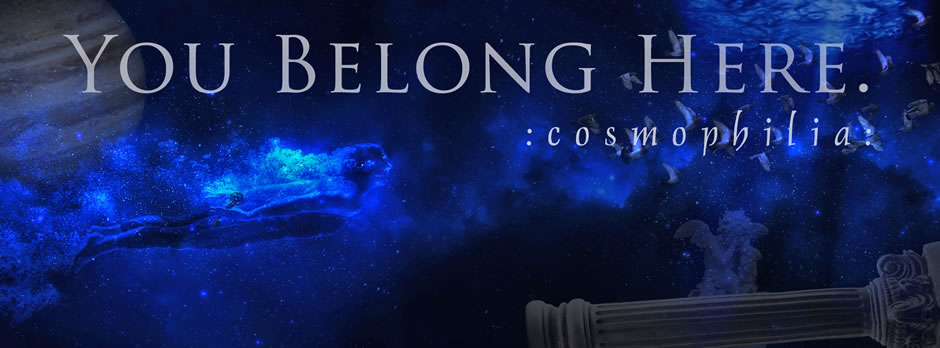 This appendixed poem on mental health and belonging was written for / originally published in the astrological PlanetWaves.net 2015 annual edition, Cosmophilia: You Belong Here.
This appendixed poem on mental health and belonging was written for / originally published in the astrological PlanetWaves.net 2015 annual edition, Cosmophilia: You Belong Here.
~~~~~
PSYCHOVARIANT BELONGING
by Greg Macdougall
disassociation
when you feel that you don’t belong
don’t want to belong in what’s going on
leave this world, find other reality
literally or ‘just’ in your mind
and then you’re different
because you know different
than them
‘them’ is when you don’t belong
when the enforced normalcy of normal
doesn’t belong on you, to you,
anywhere near you
you’ve known different-ly
feelings that really connect
with leverage points of the soul
spirit imbued with life
and the consensus don’t fit
fit you into their place
is what they know to do
their place is the place they have for you
because that’s what they fit in to
belong-ing, a yearning
but mostly out of place
but find that, when not yearned for
there is that sense of being found
of being in place, right place
at the right time
the right time is when you’ve let the yearning go
when the fears don’t rear up
and the loneliness no longer in your heart
gone along with the other clouds,
claws that threaten to shed a furtive peace
born from inhabiting a sense of wrongness
of invalidation, discredited
because your currency doesn’t seem accepted
so learning to feel your own way through
because the advice in the guise of should and ‘need to’
doesn’t feed any of what makes you you
the semblance of everyone is a master in the know
only buoyed by the sense that everyone’s bought in
to the way it’s fixed up to be
this psychotic plague known as normal
‘just the way things are’
the what you’re being taught to adapt in to
FOR FURTHER REFERENCE / APPENDIX:
psychovariant
“I identify as “psychovariant” because that label recognizes my atypical brain functioning as a source of both distress and a gift to be nurtured. This is an umbrella term that can be claimed by anyone whose brain operates divergently (ex: depression, schizophrenia, ADHD, anxiety, bipolar, DID). Identifying as psychovariant is an attempt to recast what is commonly referred to as “mental illness” through a framework that destigmatizes and celebrates neurological diversity.”
– Amanda Gelender, http://grownuptruth.com/diary-of-a-young-pro-amanda-gelender/
disassociation (dissociation)
“[P]sychological trauma results in alterations of consciousness in the domains of time, thought, body, and emotion … [A]s the levels of dissociation increase, a person is more likely to experience identity fragmentation and flashbacks/reliving (time), voice-hearing and confusion (thought), depersonalization (body), and numbing/compartmentalization (emotion). … [T]rauma effects the brain and makes one more likely to become addicted to alcohol or benzodiazapines at a neurochemical level … [E]xperiencing multiple traumas (unlike a single trauma) results in a shutting down response rather than hyperarousal and increased physiological activity. This includes: loss of emotion, loss of memory and language, shutting off of cognitive processing, deactivation of the brain, loss of physical sensation, social disengagement, miscommunication, and social withdrawal.”
– Noel Hunter, http://www.madinamerica.com/2014/11/trauma-schizophrenia-ultimate-political-battle/
leave this world
“From 2,429 suicides and 50,323 controls, the researchers found that taking psychiatric medications during the previous year made a person 5.8 times more likely to have killed themselves. If a person had made contact with a psychiatric outpatient clinic, they were 8.2 times more likely to have killed themselves. Visiting a psychiatric emergency room was linked to a 27.9 times greater likelihood of committing suicide. And if someone had actually been admitted to a psychiatric hospital, they were 44.3 times more likely to have commited suicide within the year.”
– Rob Wipond, http://www.alternet.org/personal-health/research-suggests-psychiatric-interventions-admission-mental-facility-could-increase?paging=off
fit you into their place
“Scott London: Symptoms are so often seen as weaknesses.
James Hillman: Right, so they set up some sort of medical or psychotherapeutic program to get rid of them, when the symptoms may be the most crucial part of the kid. There are many stories in my book that illustrate this.” http://thesunmagazine.org/issues/439/conversations_with_a_remarkable_man
when the enforced normal of normalcy doesn’t belong on you
“The problem of selfishness has a particular bearing on psychotherapy. The neurotic individual often is selfish in the sense that he is blocked in his relationship to others or overanxious about himself. This is to be expected since to be neurotic means that the integration of a strong self has not been achieved successfully. To be normal certainly does not mean that it has. It means, for the majority of well-adapted individuals that they have lost their own self at an early age and replaced it completely by a social self offered to them by society. They have no neurotic conflicts because they themselves, and, therefore, the discrepancy between their selves and the outside world has disappeared. Often the neurotic person is particularly unselfish, lacking in self-assertion and blocked in following his own aims. The reason for this unselfishness is essentially the same as for the selfishness. What he is practically always lacking is self-love. This is what he needs to become well. If the neurotic becomes well, he does not become normal in the sense of the conforming social self. He succeeds in realising his self, which never had been completely lost and for the preservation of which he was struggling by his neurotic symptoms. A theory, therefore, as Freud’s on narcissism which rationalises the cultural pattern of denouncing self-love by identifying it with selfishness, can have but devastating effects therapeutically. It increases the taboo on self-love. Its effects can only be called positive if the aim of psychotherapy is not to help the individual to be himself; that is, free, spontaneous and creative – qualities conventionally reserved for artists – but to give up the fight for his self and conform to the cultural pattern peacefully and without the noise of a neurosis.”
– Erich Fromm, http://digilander.libero.it/mgtund/eric_fromm.htm
you’ve known different-ly
“All war is first waged in the imagination, first conducted to limit our dreams and visions, to make us accept within ourselves its terms, to believe that our only choices are those that lay before us. If we let the terms of force describe the terrain of our battle, we will lose. But if we hold to the power of our visions, our heartbeats, our imagination, we can fight on our own turf, which is the landscape of consciousness. There, the enemy cannot help but transform.”
– Starhawk, The Fifth Sacred Thing
there is that sense of being found
“For those of us involved with this work, and for those of us who are coming into it, if this work does not transform you then you are not paying attention. If you are immune, complacent, indifferent, and untouched by the horror of human avarice and aggression, then you are not paying attention. It is not possible to be engaged in this work and not behave differently. It is not possible if we are really doing what we are supposed to be doing with this work.”
– gkisedtanamoogk, Finding Our Way Despite Modernity; in Alliances: Re/Envisioning Indigenous-non-Indigenous Relationships (Lynne Davis, ed)
a sense of wrongness
“A person who has not been completely alienated, who has remained sensitive and able to feel, who has not lost the sense of dignity, who is not yet “for sale”, who can still suffer over the suffering of others, who has not acquired fully the having mode of existence – briefly, a person who has remained a person and not become a thing – cannot help feeling lonely, powerless, isolated in present-day society. He cannot help doubting himself and his own convictions, if not his sanity. He cannot help suffering, even though he can experience moments of joy and clarity that are absent in the life of his “normal” contemporaries.”
– Erich Fromm, http://www.goodreads.com/quotes/41805-a-person-who-has-not-been-completely-alienated-who-has
sense of wrongness – pII
“Nothing is so apt to challenge our self-awareness and alertness as being at war with oneself. One can hardly think of any other or more effective means of waking humanity out of the irresponsible and innocent half-sleep of the primitive mentality and bringing it to a state of conscious responsibility.”
– Carl Jung, as quoted by Jonathan Zap, http://www.zaporacle.com/thoughts-on-jung
sense of wrongness – pIII
“Dissonance / (if you are interested) / leads to discovery.”
– William Carlos Williams
along with the other clouds
“i have kept quiet about feelings of unworthiness, loneliness, feelings of isolation, dissociation and craziness because i am scared of being left behind. and the reality is, our community leaves people behind sometimes.”
– ngọc loan trần, http://www.nloantran.com/blog/2014/6/26/fearingfueling-silence
claws that threaten
“It took many years of vomiting up all the filth I’d been taught about myself, and half-believed, before I was able to walk on this earth as though I had a right to be here.”
– James Baldwin, Collected Essays
learning to feel your way through
“In the end, there is nothing more that I can do to prove this, so therefore I just have to take the leap of faith and believe in the things that are invisible, that I can’t prove to anyone else, because they seem real to me.”
– Soren Kierkegaard
learning to feel your way through – pII
“As you consider other ways to approach what you require of yourself, let how you feel about each idea guide you. Feeling good and an inner sensation of calm are clues that a concept matches with your own genuine boundaries and personal requirements.”
– Genevieve Hathaway, PlanetWaves.net
because the advice
“Most people are other people. Their thoughts are someone else’s opinions, their lives a mimicry, their passions a quotation.”
– Oscar Wilde, De Profundis
because the advice – pII
“It’s extraordinary how much of this [judging] comes down to “why don’t you change your life, because it inconveniences me or makes me uncomfortable.” People don’t want to admit that, so they throw a lot of other judgmental ornaments around the edges and hope no one will see their version of the ninja double reverse.”
– Maria Padhila, PlanetWaves.net
psychotic plague known as normal
“The saving of our world from pending doom will come, not through the complacent adjustment of the conforming majority, but through the creative maladjustment of a nonconforming minority.”
– Martin Luther King Jr, Strength To Love
what you’re being taught to adapt in to
“If I didn’t define myself for myself, I would be crunched into other people’s fantasies for me and eaten alive.”
– Audre Lorde, Zami: A New Spelling of My Name
what you’re being taught to adapt in to – pII
“Only the strong go crazy. The weak just go along.”
– Assata Shakur
~~~~~
 Interdependent media & in-person learning opportunities for those who are inspired to be part of movements for social justice.
Interdependent media & in-person learning opportunities for those who are inspired to be part of movements for social justice.
Latest comments